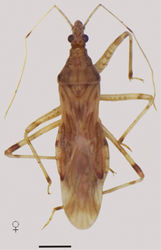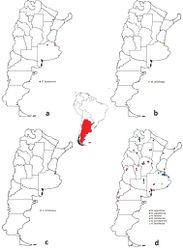Lasiomerus constrictus
| Notice: | This page is derived from the original publication listed below, whose author(s) should always be credited. Further contributors may edit and improve the content of this page and, consequently, need to be credited as well (see page history). Any assessment of factual correctness requires a careful review of the original article as well as of subsequent contributions.
If you are uncertain whether your planned contribution is correct or not, we suggest that you use the associated discussion page instead of editing the page directly. This page should be cited as follows (rationale):
Citation formats to copy and paste
BibTeX: @article{Cornelis2013ZooKeys333, RIS/ Endnote: TY - JOUR Wikipedia/ Citizendium: <ref name="Cornelis2013ZooKeys333">{{Citation See also the citation download page at the journal. |
Ordo: Hemiptera
Familia: Nabidae
Genus: Lasiomerus
Name
Lasiomerus constrictus (Champion, 1899) – Wikispecies link – Pensoft Profile
- Nabis (Hoplistoscelis) constrictus Champion 1899[1]. Biologia Centrali-Americana 2: 303.
- Nabis constrictus Blatchley 1926[2]. Heteroptera or True Bugs of Eastern North America, with especial reference to the faunas of Indiana and Florida: 596.
- Nabis (Lasiomerus) constrictus Harris 1928[3]. Entomologica Americana 9: 51.
- Lasiomerus constrictus Henry and Lattin 1988[4]. Catalog of the Heteroptera, or True Bugs, of Canada and the Continental United States, p 512. Volpi and Coscarón 2010[5]. Zootaxa 2513: 57.
Material examined
ARGENTINA: BUENOS AIRES: San Isidro 34°28'14.98"S, 58°31'43.00"W, 1 ♀ (NHRS).
Distribution in Argentina
Buenos Aires: San Isidro.
Distribution outside Argentina
Guatemala; Honduras; México: Atoyac, Teapa; Panama: Volcan de Chiriqui. México to Panama.
Measurements
Female (n = 1):Length 6.88. Head: length 0.83, width 0.67; eye width 0.31, interocular width 0.26. Rostrum: ratio of segment lengths about 1: 3.86 : 3.47 : 2.08. Antenna: ratio of segment about 1: 1.56 : 1.56 :1.45. Pronotum length 1.19, width 1.40. Hemelytra length 4.68. Abdomen: length 3.12, width 1.76. Legs: fore femora: length 1.82, width 0.26; middle femora: length 1.71, width 0.20; hind femora 2.34, width 0.15. Fore tibiae: length 1.66, width 0.10; middle tibiae: length 1.71, width 0.10; hind tibiae: length 2.96, width 0.078.
Description
Body elongated and light brown. Head covered with abundant long white setae; area between eyes and antennae, and lateral anteocular region brown. Rostrum reaching middle coxae. Antennae long with setae, segment II with a distal band dark brown band; segments III and IV darker than I and II.
New records
1 ♀: Argentina: Buenos Aires: San Isidro 34°28'14.98"S, 58°31'43.00"W, (NHRS).
Taxon Treatment
- Cornelis, M; Coscarón, M; 2013: The Nabidae (Insecta, Hemiptera, Heteroptera) of Argentina ZooKeys, 333: 1-30. doi
Other References
- ↑ Champion G (1897–1901) Insecta: Rhynchota (Hemiptera-Heteroptera), Volume II. In: Godman FD, Salvin O (Eds) Biologia Centrali-Americana, printed by Taylor and Francis, London, xvi + 1–416, 22 plates. [Nabidae: 1899: 297–304; 1900: 305–306]
- ↑ Blatchley W (1926) Heteroptera or True Bugs of Eastern North America, with Especial Reference to the Faunas of Indiana and Florida. Nature Publishing Company, Indianapolis. 1116 pp. http://www.biodiversitylibrary.org/item/29937
- ↑ Harris H (1928) A monographic study of the hemipterous family Nabidae as it occurs in North America. Entomologica Americana 9: 1-97.
- ↑ Henry T, Lattin J (1988) Family Nabidae Costa, 1853. The damsel bugs. In: Henry T Froeschner R (Eds). Catalog of the Heteroptera, or True Bugs, of Canada and the Continental United States. E. J. Brill, Leiden and New York: 508-520.
- ↑ Volpi L, Coscarón M (2010) Catalog of Nabidae (Hemiptera: Heteroptera) for the Neotropical Region. Zootaxa 2513: 50-68.
Images
|


